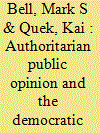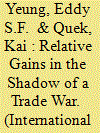| Srl | Item |
| 1 |
ID:
158381


|
|
|
|
|
| Summary/Abstract |
The “democratic peace”—the regularity that democracies rarely (if ever) fight with other democracies but do fight with nondemocracies—is one of the most famous findings in international relations scholarship. There is little agreement, however, about the mechanism that underpins the democratic peace. Recently, scholars have shown that mass publics in liberal democracies are less supportive of using military force against other democracies. This finding has been taken to support the idea that the content of public opinion may provide one mechanism that underpins the democratic peace. Using a large-scale survey experiment, we show that mass publics in an authoritarian regime—China—show the same reluctance to use force against democracies as is found in western democracies. Our findings expand the empirical scope of the claim that mass publics are reluctant to use force against democracies, but force us to rethink how public opinion operates as a causal mechanism underpinning the democratic peace.
|
|
|
|
|
|
|
|
|
|
|
|
|
|
|
|
| 2 |
ID:
137783


|
|
|
|
|
| Summary/Abstract |
There is always a time gap between the decision for war and its implementation. I exploit this time gap to study how the signaling of resolve changes after the decision for war is made, based on the wars that China fought since 1949. I study the series of signals that China sent after it had made its decisions for war in Korea (1950), India (1962) and Vietnam (1979), and compare them with the signals sent just before the decisions were made. I find patterns in Chinese prewar signaling that reflect how strategic incentives for the signaling of resolve change before and after the decision for war. The study generates theoretical expectations on discontinuities in signaling behavior upon the decision for war – an unexplored research area with direct policy implications.
|
|
|
|
|
|
|
|
|
|
|
|
|
|
|
|
| 3 |
ID:
178997


|
|
|
|
|
| Summary/Abstract |
Two mechanisms of costly signaling are known in international relations: sinking costs and tying hands. I show that there exist four mechanisms of costly signaling that are equally general. I develop the new mechanisms of installment costs and reducible costs and contrast them with sunk costs and tied-hands costs. I then conduct experiments to test the four signaling mechanisms. I find that each mechanism can improve credibility when the costs are high, but reducible costs can improve credibility even when the costs are low.
|
|
|
|
|
|
|
|
|
|
|
|
|
|
|
|
| 4 |
ID:
178894


|
|
|
|
|
| Summary/Abstract |
Militaries are sustained by public money that is diverted away from other domestic ends. How the public react to the “guns-versus-butter” trade-off is thus an important question in understanding the microfoundations of Chinese military power. However, there are few studies on public attitudes towards military spending in China, whose rising power has been a grave concern to many policymakers around the world. We fielded a national online survey to investigate the nature of public support for military spending in China. We find that Chinese citizens support military spending in the abstract, but their support diminishes when considered alongside other domestic spending priorities. We also find that public support for military spending coexists surprisingly with anti-war sentiments and a significant strain of isolationism. In addition, while the conventional wisdom suggests that nationalism moves a state towards bellicosity and war, we find that Chinese citizens with a stronger sense of national pride report stronger anti-war sentiments than other citizens.
|
|
|
|
|
|
|
|
|
|
|
|
|
|
|
|
| 5 |
ID:
186598


|
|
|
|
|
| Summary/Abstract |
When do people care about relative gains in trade? Much of the international relations scholarship—and much of the political rhetoric on trade—would lead us to expect support for a trade policy that benefits ourselves more than it benefits others. Yet, a large interdisciplinary literature also points to the prevalence and importance of other-regarding preferences, rendering the conventional wisdom contestable. We investigate whether and how relative gains influence trade preferences through an original survey experiment in the midst of the China–US trade war. We find that in a win-win scenario, relative gains shape trade opinion: if both sides are gaining, people want to gain more than their foreign trade partner. However, these considerations are offset in a win-lose scenario where the other side is losing out. Relative-gains considerations causally affect opinion on trade, but not in a “beggar-thy-neighbor” or even a “beggar-thy-rival” situation. These findings contribute to our understanding of the role of relative gains in international relations and provide the first experimental evidence that relative-gains considerations can be offset by other-regarding preferences in international trade.
|
|
|
|
|
|
|
|
|
|
|
|
|
|
|
|